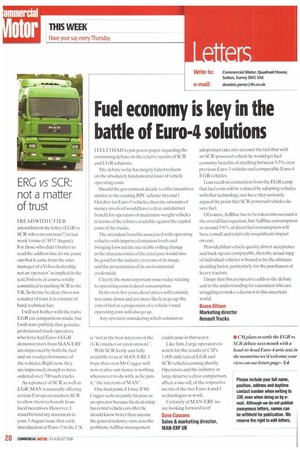Fuel economy is key in the battle of Euro-4 solutions
Page 20

If you've noticed an error in this article please click here to report it so we can fix it.
I FLU I HAD to put pen to paper regarding the continuing debate on the relative merits of SCR and EGR solutions.
The debate so far has largely failed to focus on the absolutely fundamental issue of vehicle operating costs.
Should the government decide to offer incentives similar to the existing RPC scheme beyond 1 October for Euro-5 vehicles, then the amounts of money involved would have a clear and distinct benefit for operators of maximum-weight vehicles in terms of the rebates available against the capital costs of the trucks.
"Ibe attendant benefits associated with operating vehicles with improved emission levels and bringing forward the inevitable rolling change in the characteristics of the total pare would also be good for the industry in terms of its image and the presentation of its environmental credentials.
Clearly the most important issue today relating to operating costs is diesel consumption.
In the next five years diesel prices will certainly not come down and are more likely to go up; the cost of fuel as a proportion of a vehicle's total operating costs will also go up.
Any operator considering which solution to adopt must take into account the fact that with an SCR-powered vehicle he would get fueleconomy benefits of anything between 3-5% over previous Euro-3 vehicles and comparable Euro-4 EGR vehicles.
I can recall no contention from the EGR camp that fuel costs will be reduced by adopting vehicles with that technology, nor have they seriously argued the point that SCR-powered vehicles do save fuel.
Of course,AdBlue has to be taken into account it the overall fuel equation, but AdBlue consumption at around 5-6% of diesel fuel consumption will have a small and relatively insignificant impact on cost.
Provided that vehicle quality, driver acceptance and back-up are comparable, then the actual mpg of individual vehicles is bound to be the ultimate deciding factor, particularly for the purchasers of heavy tractors.
I hope that this perspective adds to the debate and to the understanding for customers who are struggling to make a decision in this uncertain world.
Bruce Allison Marketing director Renault Trucks
























































































































































































